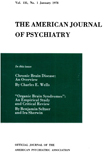The Volunteer Rescue Squad: The Impact of a Group on the Psychological Adaptation of Its Members
Abstract
Young rescue squad volunteers were studied to ascertain some of the developmental determinants of rescue work and to define aspects of the culture of the squad and relate these to the personal development of its members. The authors suggest that squad membership may serve important adaptive functions for the individual: in mastering past traumas, becoming independent from the primary family, and in developing self-control and competence. They indicate the need for further study of the contribution of voluntary group membership to the individual's development and adaptation; there may be important implications for various types of therapy and for community consultation.
Access content
To read the fulltext, please use one of the options below to sign in or purchase access.- Personal login
- Institutional Login
- Sign in via OpenAthens
- Register for access
-
Please login/register if you wish to pair your device and check access availability.
Not a subscriber?
PsychiatryOnline subscription options offer access to the DSM-5 library, books, journals, CME, and patient resources. This all-in-one virtual library provides psychiatrists and mental health professionals with key resources for diagnosis, treatment, research, and professional development.
Need more help? PsychiatryOnline Customer Service may be reached by emailing [email protected] or by calling 800-368-5777 (in the U.S.) or 703-907-7322 (outside the U.S.).



